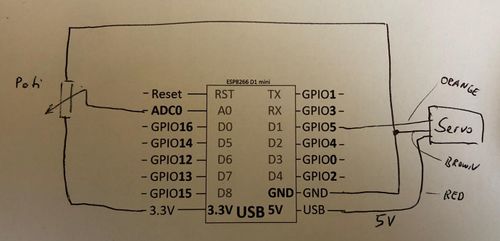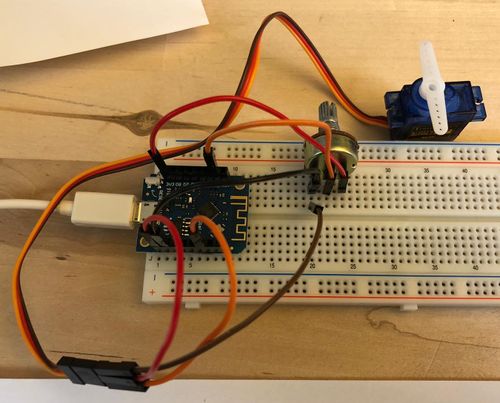Difference between revisions of "SG90 Servo"
Jump to navigation
Jump to search
| Line 21: | Line 21: | ||
servoPin = Pin(5, Pin.OUT) | servoPin = Pin(5, Pin.OUT) | ||
pwm = PWM(servoPin, freq=50) | pwm = PWM(servoPin, freq=50) | ||
| − | pwm.deinit() | + | pwm.deinit() # workaround to reset PWM |
pwm = PWM(servoPin, freq=50) | pwm = PWM(servoPin, freq=50) | ||
Revision as of 22:07, 22 December 2020
Contents
IMPORTANT
In many computers the current is not enough to drive the servo!!!
If it does not work, keeps disconnecting, or rebooting the ESP the power is not sufficent and you need an extra power supply.
Schematic - Connecting the SG90
Code Examples ESP8266
Basic control
Assuming the servo is connected to Pin 5.
1 from machine import Pin,PWM
2 from time import sleep
3
4 servoPin = Pin(5, Pin.OUT)
5 pwm = PWM(servoPin, freq=50)
6 pwm.deinit() # workaround to reset PWM
7 pwm = PWM(servoPin, freq=50)
8
9 val = 50
10
11 while True:
12 pwm.duty(val)
13 val = val + 1
14 if val>100:
15 val = 50
16 print(val)
17 sleep(0.05)
Controlling the servo with a Poti
A0 is the analog input with 10 bit resolution. It reads the analog value every second and print it to the console and sets the servo based on the analog input.
1 from machine import Pin, ADC, PWM
2 from time import sleep
3
4 analogPin = ADC(0)
5 servoPin = Pin(5, Pin.OUT)
6 pwm = PWM(servoPin, freq=50)
7 pwm.deinit()
8 pwm = PWM(servoPin, freq=50)
9
10 while True:
11 analogVal = analogPin.read()
12 pwm.duty(int(analogVal/10))
13 print(analogVal)
14 sleep(1)
Related Tutorial Videos

